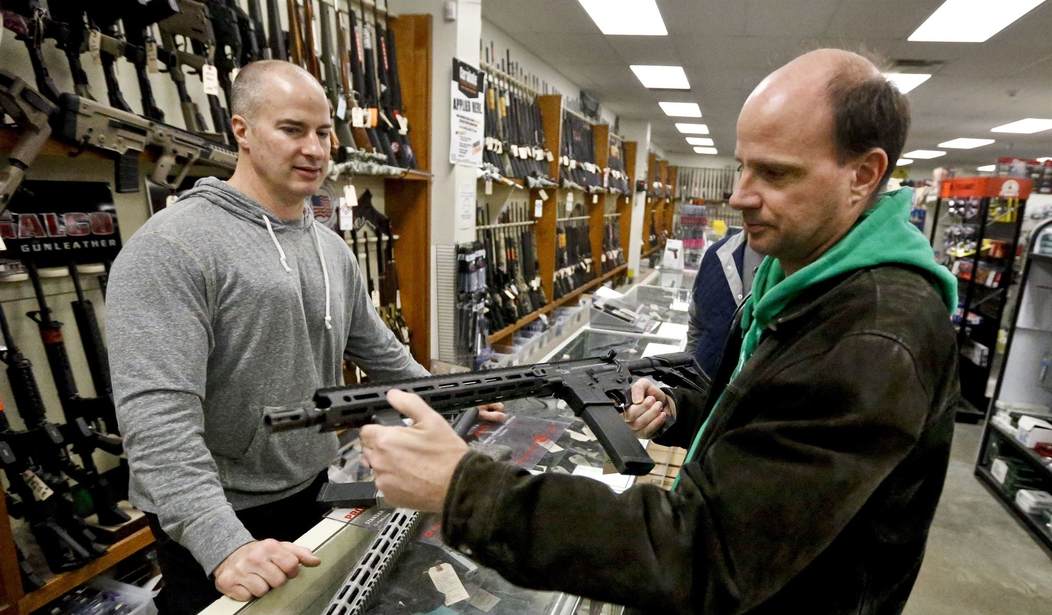There’s an old saying on the streets of Baltimore (and elsewhere) that informs us that “snitches get stitches.” And in Baltimore, being a snitch can get you far worse than that. But to the north, in New York City, a coalition of public sector pension funds, along with Mayor Eric Adams and the City Comptroller, would like to see a particular set of potential snitches win some rewards. In this case, the “reward” would be the ability to keep doing business and the snitches would be the major credit card companies. The group is filing a “shareholder proposal” that would see the credit card companies add a new four-digit merchant code to transaction records when the cards are used at gun shops for the purchase of firearms and ammunition. The staggering number of things wrong with this proposal is impressive even by New York standards. (NY Post)
New York City officials Tuesday said they want major credit-card companies to create a code to track purchases of guns and ammunition to help law enforcement try to keep better tabs on criminals.
Officials with the city’s pension funds — the New York City Employees’ Retirement System, Teachers’ Retirement System and Board of Education Retirement System — along with Mayor Adams and City Comptroller Brad Lander said they are filing a shareholder proposal to that end.
They are requesting that credit-card companies such as American Express, Mastercard and Visa add a new four-digit “merchant code” that would classify gun and ammunition stores on individual statements when purchases are made.
You can see the first and potentially most glaring flaw in this plan right in the description offered by the group. They would like these “merchant codes” to be added to transactions so that law enforcement can “keep better tabs on criminals.”
This is simply absurd and the people pushing the plan already know it, or at least they should. Gang bangers and other criminals do not purchase firearms and ammunition by walking into a gun shop holding an FFL and plop down their Visa card to complete the transaction. The vast majority of them already have criminal records and would not be eligible to legally purchase a firearm. They buy their guns on the black or gray markets and the transactions are almost always handled with cash. The FBI could provide them with the statistics if they bothered to ask.
Mayor Adams went on to claim that these merchant codes could “help companies track when suspicious purchases are made and could help law enforcement even stop shootings before they happen.” First of all, how is the shop owner supposed to determine when a purchase is “suspicious?” If the person is of the appropriate age, has valid identification, and passes their background check, why is any purchase they make “suspicious?” Since when is it the shop owner’s business or that of the city government if a lawful gun owner makes a purchase?
And how could having the credit card companies track this data help “stop shootings before they happen?” This clearly implies that the records kept by the credit card companies would be in the hands of the police or city hall prior to any crime being committed. It sounds as if they’re asking the major credit card companies to just begin compiling a list of all transactions involving firearms and ammunition and report them to the government as part of their routine. Since it would include the names of the purchasers, that sounds an awful lot like a firearms owner tracking database, doesn’t it?
We should also make note of the rather nefarious approach that’s being taken by the participants here. This isn’t a case of the City Council trying to pass a law mandating this sort of sales tracking by the credit card companies and the Mayor signing it into law. Instead, that formed a coalition of the directors of a number of public sector pension funds, including the retirement systems for the municipal employees, the teacher’s unions and the board of education. (Remind me what they have to do with law enforcement again?) They are basically threatening the credit card companies into doing what they want or risk having those very large funds take their business elsewhere. It’s economic blackmail to produce a result that would normally require a “law” that would never stand up in court.
If law enforcement gathers evidence about a firearm used in a crime and they want to track down the sales information involving that weapon (assuming such exists), they are free to get a warrant and go request it from the gun shop. The shop will happily comply. If that helps solve the crime, great. There’s one less criminal on the streets, assuming you can get a prosecutor in New York City to actually lock them up. But this wholesale shopping for firearms sales transaction data outside of the law via blackmail is outrageous. And it should not be allowed to proceed.








